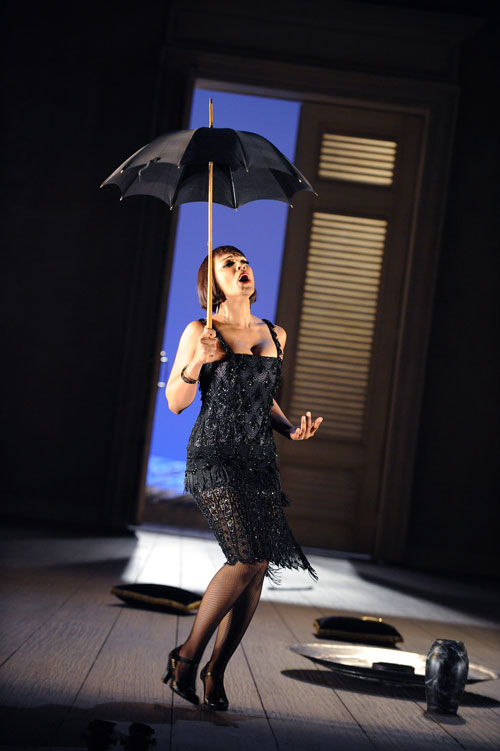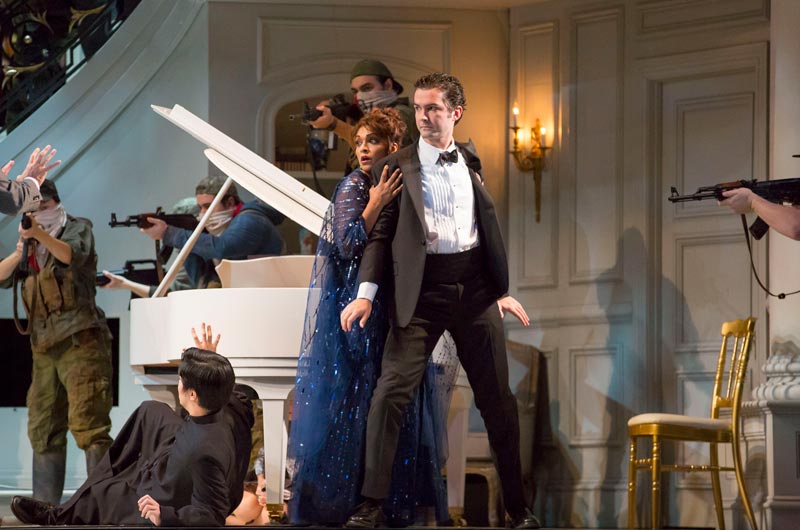By Kyle MacMillan
When the New York Times Magazine profiled Danielle de Niese in 2009, a headline writer astutely dubbed her “opera’s coolest soprano.” And the moniker has stuck.
Although the opera world has changed significantly in recent years, and considerably more emphasis is placed on dramatic realism and visual appeal, the field still struggles with lingering stereotypes of stiffness and staidness. But there is nothing stiff or staid about this bubbly, beautiful, and appealingly down-to-earth soprano, who won an Emmy Award at age 16 as a regular guest host of the television show L.A. Kids and has since performed with the likes of rapper LL Cool J.
De Niese (or “Danni” as her friends call her) is one of the rare—indeed, virtually unique—classical stars who has managed to attain pop-culture cred while making a name for herself at the world’s top opera and concert houses. So, yes, there are plenty of reasons to call her opera’s coolest soprano.
“To be honest, when it [the article] came out, I didn’t think much about it,” the singer says. “I didn’t think that title would stick in that way. I’m tremendously flattered. And I like it, because I’ve always endeavored to show my generation and younger generations what it is I do and how cool I think it is and get people to be open-minded about classical music.”
She devotes considerable time in England, where she resides, to such organizations as Children and the Arts, and she is always ready to take part in arts-outreach activities wherever she goes, including during past visits to Chicago. De Niese believes that her relative youth—she is 37—helps her connect with budding generations. That was especially true at the beginning of her career, when she was singing opera professionally while still a teenager.
“They just didn’t see me coming,” she says. “They sort of thought, ‘What? No! She’s not an opera singer. What?’ They would be really shocked. I always find the element of surprise is good for young people, because they’re like, ‘Oh, okay, that just blew me away. Maybe I need to know a little more about it.’ ”
De Niese’s unconventional path to classical stardom began in Australia, where she was born to Sri Lankan parents and soon began taking singing, dancing, and acting lessons. In 1988, at age 9, she became the youngest winner of an Australian television show, Young Talent Time, singing a medley of Whitney Houston songs. But as much as she was enamored with pop hits as a child, she also loved classical music, holding up New Zealand soprano Kiri Te Kanawa as another musical idol.
When her family moved to Los Angeles when she was 10, she continued her classical training at the respected Colburn School, but kept up the popular side of her budding performing career, appearing on the 1990–93 television talk show series L.A. Kids. In the end, though, her love of classical music won out over everything else, and she made her professional debut at 15 with the Los Angeles Opera.
Aside from a brief stint at New York’s Mannes College of Music, the soprano skipped over conservatory studies and became the youngest singer ever to participate in the Metropolitan Opera’s prestigious Lindemann Young Artist Development Program. Then in 1998, at age 19, she debuted with the nation’s preeminent company as Barbarina in a new production of The Marriage of Figaro directed by Jonathan Miller and conducted by James Levine. Also taking part were such celebrated singers as Cecilia Bartoli, Renée Fleming, and Bryn Terfel. “It was just this extreme dream-team cast,” she recalls, “and there was 19-year-old me as Barbarina. It was incredible company. That was my first career milestone—a big, big one.”
 Photo: Mike HobanBut an even more important turning point came in 2005 at the Glyndebourne Festival Opera in Sussex, England. De Niese became something of an international sensation after a brilliant turn as Cleopatra in Julius Caesar—a David McVicar–directed rethinking of the Baroque opera that included unusual choreographed body movements during some of the arias. “Her singing is utterly delectable and completely assured,” wrote music critic Paul Griffiths in the New York Times. “She looks terrific in a range of costumes that includes flapper dress, riding gear, slinky cocktail gown, and full 18th-century, wide-skirted outfit. And she matches the bravura and allure of her voice with movement that is at once silly and sexy.”
Photo: Mike HobanBut an even more important turning point came in 2005 at the Glyndebourne Festival Opera in Sussex, England. De Niese became something of an international sensation after a brilliant turn as Cleopatra in Julius Caesar—a David McVicar–directed rethinking of the Baroque opera that included unusual choreographed body movements during some of the arias. “Her singing is utterly delectable and completely assured,” wrote music critic Paul Griffiths in the New York Times. “She looks terrific in a range of costumes that includes flapper dress, riding gear, slinky cocktail gown, and full 18th-century, wide-skirted outfit. And she matches the bravura and allure of her voice with movement that is at once silly and sexy.”
The soprano still looks back at the production with a certain awe. “I think of Julius Caesar,” she says, “in the way that I imagine Kate Winslet and Leonardo DiCaprio think of Titanic. It’s just one of those monumental things—those moments when the stars align and everything works and it’s bigger than big. And anyone who was in it, we all feel the same way.”
De Niese has gone on to triumphs with other important international companies, but she regularly returns to the stage of Glyndebourne, where she has a very personal tie. In 2009, de Niese married Gus Christie, the grandson of Glyndebourne’s founder who now serves as the company’s chairman, and the two reside on the festival’s grounds with their 1-year-old son. From May 22 through July 17, she is portraying Rosina in Glyndebourne’s latest version of The Barber of Seville.
Not only is this production her debut in the role, it’s her first experience ever with the opera. “I remember thinking, ‘I’ve never actually seen a Barber,’ and being slightly worried about what that meant,” she says. “But, actually, I was freed from any of the traditions that follow these pieces around, and there are many that follow them around. It was great. It allowed me to give Rosina a very fresh perspective—just looking into the text and the score and seeing who this person was.”
Asked if she considers Glyndebourne to be her “home” company now, de Niese is torn. While conceding that in many ways it obviously is, she also has strong emotions for the Metropolitan Opera, where she returns regularly. “There’s a special stomping-ground feeling that I have when I go back to the Met,” she says, “because that was my first home and I do love it there. I was a kid at the Met, and then I grew into the performer that I am, and an adult as well. I run into the crew members and they’ve known me for more than half my life. That’s pretty special.”
While her performance history at Lyric Opera of Chicago is not as extensive, she nonetheless cites it as a company where she has had a substantial presence as well, including a reprise of the role of Cleopatra during 2007/08. This past season, she starred in the world premiere of Jimmy López’s Bel Canto, which was inspired by Ann Patchett’s best-selling novel about a months-long hostage crisis in Peru. Rehearsals were underway when a coordinated terrorist attack took place in Paris that killed 130 people, and the work’s ripped-from-the-headlines intensity ratcheted even higher. “It got real—and fast,” de Niese says.
 Photo: Todd Rosenberg
Photo: Todd Rosenberg
Shortly after completing her run of performances in The Barber of Seville at Glyndebourne, the soprano will return to Chicago for her August 4 Ravinia-debut recital with pianist Kevin Murphy, who directs the program for singers at Ravinia’s Steans Music Institute, where she will also lead a master class two days later. Because she has known so many people who have performed at Ravinia—including Levine, who formerly served as its music director—she says an appearance at the festival has been on her “bucket list,” and she feels both excited and nervous.
Even though she is best known as an opera singer, de Niese says that classic song and chamber music have also been very important to her. “It’s a bit of a funny paradox, that something that you feel is so integral to your whole being has always been something people just don’t see you do,” she says. She focused heavily on such repertoire as a young singer, when she spent summers at three of the country’s best-known classical music festivals, starting at age 13 at Tanglewood.
“I love being a recitalist,” she says. “It’s a very personal experience. An opera production is a collaborative thing. You bring so much of yourself and your beliefs to a role, but you are in collaboration with your director and everyone who is working on the show. Whereas, a recital is a very small production—it’s you and the pianist. What you do is literally your own, and I really enjoy that.”
A highlight of de Niese’s program, which will also include a Mozart aria and songs by such composers as Georges Bizet and John Dowland, is Haugtussa, an 1895 set of songs by Norwegian composer Edvard Grieg. “This song cycle is amazing,” she says. “It’s operatic in proportion. It’s so beautiful and intimate and colorful.” Although there is a German version of these songs that is more commonly done, de Niese opted to learn the Norwegian texts, because the composer’s national heritage is so integral to these works. “I felt like I would be cheating myself, cheating him, and cheating everybody not to do it,” she says.
Also featured will be Fiançailles pour rire, an infrequently heard song cycle by 20th-century composer Francis Poulenc. De Niese started performing three songs from the group when she was 13, and later, with the encouragement of a piano collaborator, she began singing all six. She quickly admits that Poulenc’s music can be tough for audiences, and she is never sure how listeners will respond to these innately French works. But she enjoys them so much that she is willing to take the risk. “It does leave a funny taste,” she says. “It’s sort of a salty–sweet taste. It’s not a cycle that makes you want to rapturously respond. It kind of invades you and then it stays with you like a mist.”
Because de Niese has been performing professionally in the opera world for more than 20 years, it’s easy to forget that she is just 37. Unlike most singers who begin their careers in their late 20s or early 30s, she was already onstage as a teenager. “I was a kid,” she says. “When other people were doing conservatory and then master’s degrees and going to become apprentices, I was already out in the world. So it’s like The Truman Show. I sort of grew up in front of everybody.”
Kyle MacMillan served as classical music critic for the Denver Post from 2000 through 2011. He currently freelances in Chicago, writing for such publications and websites as the Chicago Sun-Times, Wall Street Journal, Opera News, and Classical Voice of North America.
Purchase tickets for Danielle de Niese's August 4 concert at Ravinia.org

